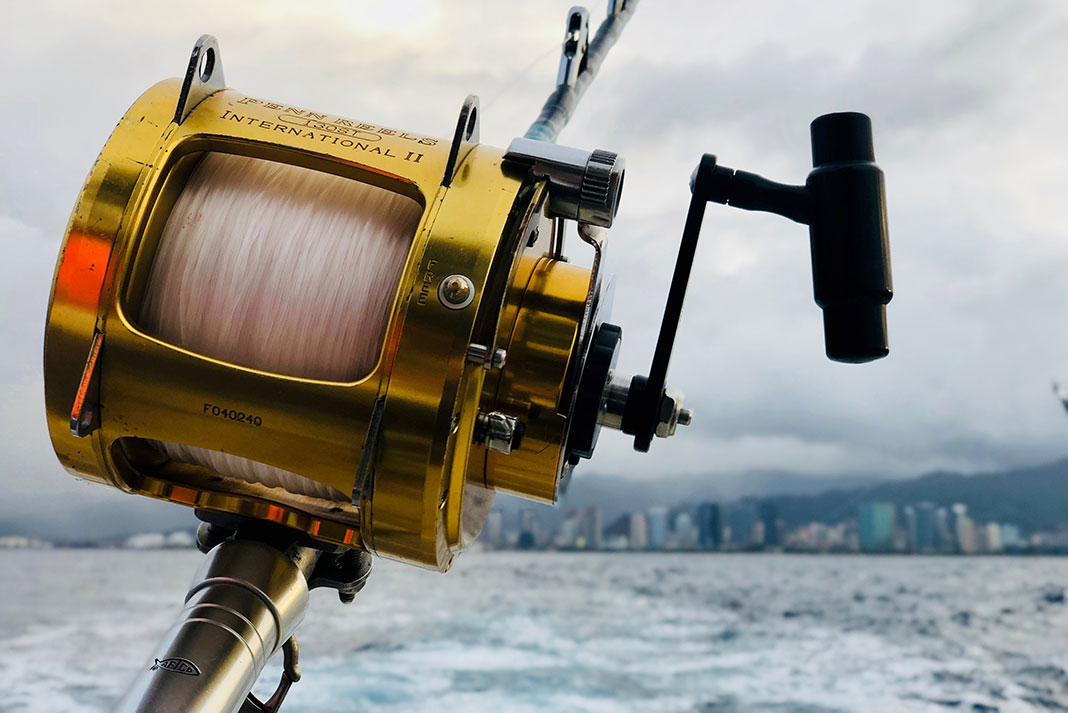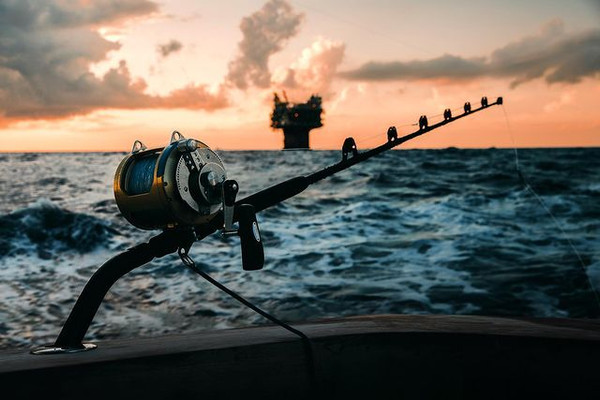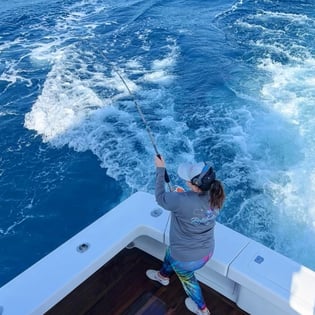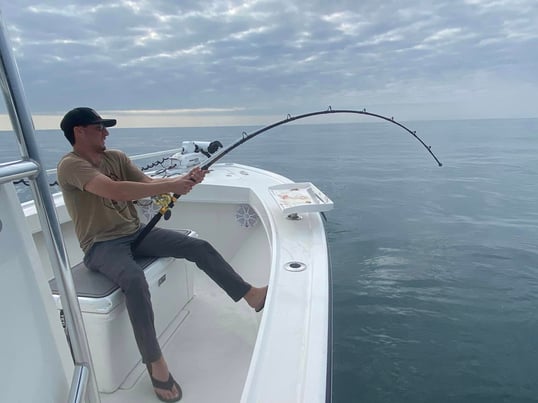Yes, you can use a spinning reel for deep sea fishing, but it may not be the most ideal choice. With its lightweight design and smaller line capacity, a spinning reel may not be able to handle the heavy duty demands of deep sea fishing, especially when targeting larger, stronger fish species.
Instead, it is recommended to use a conventional reel or a baitcasting reel for deep sea fishing, as they offer better line capacity and drag systems to handle the challenges of deep sea angling. Nevertheless, a spinning reel can still be used for light tackle deep sea fishing or when targeting smaller fish species.

Credit: kayakanglermag.com
Understanding The Basics Of Deep Sea Fishing
Exploring The Thrill Of Deep Sea Fishing
Deep sea fishing is an exhilarating and challenging sport that brings out the adventurer in all of us. The vast ocean, the thrill of the chase, and the anticipation of reeling in monster-sized fish make it a favorite pastime for many anglers.
In this section, we will delve into the basics of deep sea fishing and discover what sets it apart from other types of fishing. So, grab your gear and get ready to embark on an exciting journey into the depths of the sea!
What Sets Deep Sea Fishing Apart From Other Types Of Fishing?
When it comes to deep sea fishing, there are several key factors that set it apart from other types of fishing:
- Location: Deep sea fishing takes place in deeper waters, typically starting at depths of 30 meters. This means that you will need to venture farther offshore to reach the prime fishing grounds, where the big game fish lurk. It’s not a leisurely fishing trip near the shore – it’s an adventure on the open sea.
- Target species: In deep sea fishing, you’re targeting larger species of fish like marlin, tuna, swordfish, and mahi-mahi. These are game fish known for their size, strength, and fighting abilities. The thrill of reeling in a massive marlin or a feisty tuna is what draws anglers to this sport.
- Tackle and equipment: Deep sea fishing requires specialized tackle and equipment designed to handle the demands of battling big fish in deep water. Heavy-duty rods, strong reels, and sturdy fishing lines are necessary to withstand the intense pressure and potential line-breaking encounters with powerful fish.
- Techniques: Deep sea fishing employs different techniques compared to other types of fishing. Trolling, whereby lines are dragged behind a moving boat, is a popular method for targeting pelagic species. Bottom fishing involves dropping baited hooks to the seafloor to entice fish that dwell near the ocean floor. Jigging and live bait fishing are also commonly used techniques in deep sea fishing.
- Adventure and challenge: Deep sea fishing offers a unique sense of adventure and challenge. It requires patience, skill, and determination to navigate the open sea, locate fish, and successfully reel them in. The element of unpredictability adds to the excitement and keeps anglers coming back for more.
The Role Of A Spinning Reel In Deep Sea Fishing
In deep sea fishing, a spinning reel can serve a valuable purpose and offers certain advantages. Here’s what you need to know:
- Versatility: Spinning reels are versatile and can be used in various fishing situations, including deep sea fishing. They are suitable for handling lighter tackle and are ideal for casting and retrieving in open water.
- Ease of use: Spinning reels are user-friendly, making them a popular choice among beginners and experienced anglers alike. They require less manual dexterity and skill compared to other reel types, such as baitcasting reels.
- Casting distance: Spinning reels are known for their ability to cast at longer distances, which can be advantageous when targeting fish in deep waters. The ability to reach greater distances increases your chances of attracting fish and covering more ground.
- Handling lighter lines: Spinning reels allow for the use of lighter fishing lines, which can be beneficial when targeting certain species. Lighter lines offer increased sensitivity, allowing you to detect subtle bites, and are less likely to spook fish in clear water conditions.
- Fighting power: While spinning reels may not be as robust as heavy-duty conventional reels, they can still provide enough fighting power to tackle medium-sized fish encountered during deep sea fishing trips. With proper angling techniques and equipment, spinning reels can handle the challenge of battling these powerful fish.
Deep sea fishing offers a thrilling and unique experience for anglers seeking adventure and the thrill of catching big game fish. Understanding the differences that set it apart from other types of fishing, as well as the role of a spinning reel in this pursuit, will enhance your overall fishing experience and increase your chances of success on the open sea.
So, get out there, cast your lines, and immerse yourself in the excitement of deep sea fishing!
Choosing The Right Spinning Reel For Deep Sea Fishing
——————————————————
When it comes to deep sea fishing, having the right spinning reel can make all the difference in your experience. A spinning reel is a popular choice for many anglers due to its versatility and ease of use. However, not all spinning reels are suitable for deep sea fishing, so it’s important to understand the factors to consider when selecting one.
Factors To Consider When Selecting A Spinning Reel:
- Durability: Deep sea fishing can be a rigorous activity, so you’ll want a spinning reel that can withstand the saltwater and handle large fish. Look for reels made from corrosion-resistant materials such as aluminum or stainless steel.
- Line capacity: Deep sea fishing often requires heavier lines to handle bigger prey. Make sure to choose a spinning reel with a high line capacity to accommodate the strength and length of the lines you’ll be using.
- Drag system: The drag system of a reel is crucial when fighting large fish. Opt for a spinning reel with a smooth and powerful drag system that can handle the intense pressure that deep sea fishing can bring.
- Gear ratio: The gear ratio determines the speed at which the line is retrieved. For deep sea fishing, a higher gear ratio is preferable as it allows for faster line retrieval when dealing with big game fish.
Understanding The Importance Of Gear Ratio:
- A higher gear ratio, such as 6: 1 or 7:1, is ideal for deep sea fishing as it enables you to quickly reel in your catch. This is especially important when dealing with fast and powerful fish that can easily take your line.
- On the other hand, a lower gear ratio, such as 4: 1 or 5:1, is better suited for situations where you need more power to reel in larger fish. It provides better torque, making it easier to pull in stubborn or heavy fish.
The Pros And Cons Of Different Spinning Reel Sizes For Deep Sea Fishing:
- Larger spinning reels, such as 8000 and 10000 series, are commonly used for deep sea fishing due to their higher line capacity and stronger drag systems. They offer the ability to handle larger fish and heavier lines, making them suitable for chasing big game in the deep sea.
- However, larger spinning reels can be heavier and bulkier, making them less comfortable to handle for extended periods. They may also be more expensive compared to smaller reels.
- Smaller spinning reels, such as 3000 or 4000 series, are lighter and more compact, making them easier to handle and carry around. They are suitable for lighter deep sea fishing, targeting smaller species or using lighter tackle.
- While smaller reels may not have the same line capacity or drag power as larger ones, they can still handle most deep sea fishing situations. They are also more affordable and provide a better balance between performance and comfort.
Selecting the right spinning reel for deep sea fishing is essential for a successful and enjoyable fishing trip. Consider factors such as durability, line capacity, drag system, and gear ratio when making your decision. Additionally, choose a reel size that matches your fishing style and target species.
By doing so, you’ll be well-equipped to tackle the challenges of deep sea fishing and reel in that trophy catch.
Mastering Deep Sea Fishing Techniques With A Spinning Reel
When it comes to deep sea fishing, many anglers wonder if a spinning reel is suitable for tackling large and powerful fish in the depths of the ocean. While conventional reels are commonly used for deep sea fishing, a spinning reel can also be effective if you master the right techniques.
In this section, we will explore key tips and strategies for using a spinning reel successfully in deep sea fishing scenarios.
Learning The Correct Casting Techniques For Deep Sea Fishing
To effectively cast your line when deep sea fishing with a spinning reel, it is essential to employ the correct techniques. Here are the key points to keep in mind:
- Hold the spinning reel correctly: Grip the reel firmly to maintain control during casting and retrieving.
- Master the overhead cast: Practice your cast, aiming for maximum distance with smooth and fluid movements.
- Use the wind to your advantage: Adjust the direction of your cast according to the wind, enabling your bait to cover a larger area.
- Time your cast appropriately: Take into account the movement of the boat and the rhythm of the waves to improve accuracy.
Understanding How To Handle Large And Powerful Deep Sea Fish
When angling for deep sea fish, it is essential to know how to handle the power and strength of these creatures. Here are the key points to consider:
- Maintain a firm grip: Hold the spinning reel firmly and keep a steady grip on the rod to prevent losing control during the fight.
- Utilize your rod’s power: Allow the rod’s natural flex and power to absorb the fish’s force, preventing the line from snapping.
- Use the drag system correctly: Adjust the drag settings on your spinning reel to match the fish’s strength and prevent the line from breaking.
- Keep the fish away from obstacles: Steer the fish away from rocks, coral, or other underwater structures that could damage the line or cause the fish to break free.
Adjusting Drag Settings For Different Deep Sea Fishing Scenarios
The drag system on a spinning reel plays a crucial role in landing and successfully bringing in deep sea fish. Consider the following points for adjusting the drag settings:
- Light drag for smaller fish: When targeting smaller deep sea fish, such as snapper or grouper, compromising the drag setting can increase the chance of a successful hook set while still retaining control during the fight.
- Moderate drag for medium-sized fish: For species like kingfish or mahi-mahi, a moderate drag setting provides the perfect balance between control and line strength, allowing you to tire out the fish gradually.
- Heavy drag for large and powerful fish: When targeting big game fish like marlin or tuna, a heavy drag setting is necessary to withstand their powerful runs and prevent them from snapping the line.
Remember, mastering the art of deep sea fishing with a spinning reel takes practice and experience. By learning the correct casting techniques, understanding how to handle large fish, and adjusting drag settings accordingly, you can increase your chances of success while enjoying the thrill of deep sea fishing.
Conclusion
Spinning reels have long been associated with freshwater fishing, but can they handle the demands of deep sea fishing? After careful consideration, it’s clear that spinning reels can indeed be used for deep sea fishing in certain circumstances. While they may not be the ideal choice for targeting larger, more powerful species, they can still be effective for smaller game fish and in situations where finesse and precision are paramount.
With the right size and model, a spinning reel can provide the necessary strength and durability to handle the challenges of deep sea fishing. However, it’s important to note that they may not offer the same level of line capacity and torque as conventional reels designed specifically for offshore fishing.
Ultimately, the choice of reel for deep sea fishing depends on personal preference and the specific fishing situation. So, while spinning reels can certainly be used, it’s always a good idea to consider the specific needs and conditions before heading out on your next deep sea fishing adventure.






